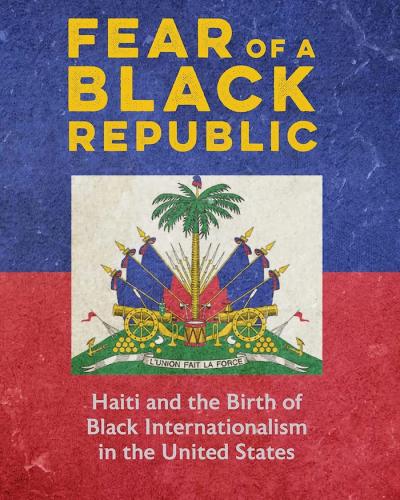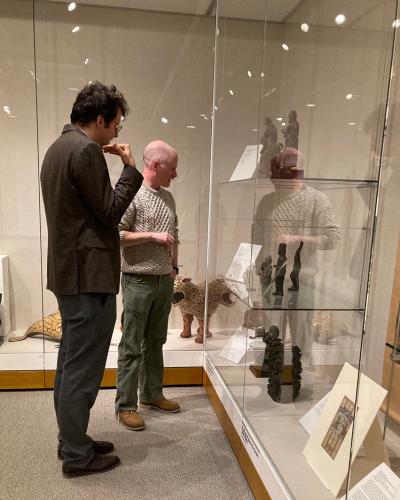This iteration of the Fellows' Q&A series features Leslie Alexander, Dr. Martin Luther King, Jr. Professor of History at Rutgers University and 2021-22 "Afterlives" Society Fellow. Her new book, Fear of a Black Republic: Haiti and the Birth of Black Internationalism in the United States was just released this month from University of Illinois Press.
Big Picture
Fear of a Black Republic seeks to radically transform how people across the nation think about Haiti and Haitian history. Following the devastating earthquake that struck Haiti in 2010, news outlets around the country reported, incessantly, that Haiti is “the poorest country in the western hemisphere” until it began to sound more like a chant of accusation rather than a statement of fact. What none of the pundits and commentators seemed willing to explore was the deeper question of WHY Haiti became a poverty-stricken nation in the first place. Instead, scholars and media talking heads alike argued that a range of ills specific to the Black nation—from the prevalence of “voodoo” to a fundamental “pathology” among the Haitian people—explained Haiti’s current plight.
In fairness to Haiti’s detractors, it is nearly impossible to escape or ignore the crushing poverty and political instability that plagues the country. Even at this moment, Haiti’s political destiny hangs in the balance as protestors seek to overthrow yet another corrupt president, placing their hope in another dubious presidential election cycle. Yet, while Haiti has been mocked and demonized for its internal problems, few are willing to ask the hard questions about HOW and WHY Haiti perpetually appears to teeter on the brink of economic and political disaster.
How did Haiti go from the being of “Pearl of the Antilles” in the 18th century to being the most impoverished nation in the Americas in 20th century? The truth is that it was not an accident of history; it was by design.
How did Haiti go from the being of “Pearl of the Antilles” in the 18th century to being the most impoverished nation in the Americas in 20th century? The truth is that it was not an accident of history; it was by design. From the birth of Haitian independence in 1804 until the present day, the United States and other western European nations have used their economic and diplomatic strength to isolate and impoverish the island nation often referred to as “The Black Republic.” This is the story that the mainstream media sought to ignore; it’s also the story that Fear of a Black Republic seeks to tell.
In order to understand the enduring fear and hatred that shaped the U.S. government’s historical and contemporary conduct towards Haiti, one must grapple with a much older story—a tale that stretches back to a time when nothing seemed more terrifying to white people around the world than the rise of a sovereign Black nation. Fear of a Black Republic illuminates that story, and examines the devastating backlash that Haiti endured for centuries, as frightened, angry whites across the globe lashed out against the courageous Black people who eradicated slavery and established a free, autonomous Black nation. Determined to maintain colonial rule, and to fortify slavery and white supremacy, white people throughout the Americas conspired to destroy Haiti, crush its independence, and ensure that a sovereign Black nation could never thrive.
At the core of this book is another, equally important, story: one that chronicles how Haiti’s triumphant ascendance created a beacon of hope for free and enslaved Black people throughout the African diaspora, especially those fighting for freedom in the United States. Cognizant of Haiti’s centrality to the global struggle for Black liberation, free and enslaved Black people in the U.S. waged an unyielding battle throughout the early nineteenth century to defend Haiti and its sovereignty. In so doing, they gave birth to a new Black internationalist consciousness—one that not only demanded an end to slavery, but also insisted on full freedom, equality, and sovereignty for Black people throughout the African diaspora.
In Particular
Nearly fifteen thousand Haitians crossed the Rio Grande River in September 2021, desperately seeking asylum in the United States. Toting small children, and lugging their remaining belongings, they had traveled for months or even years. Painstakingly making their way through numerous South American countries, often suffering unspeakable cruelties, they came in hopes of finding refuge in the U.S. Despite the nation’s centuries-old slogan, “Give me your tired, your poor, your huddled masses yearning to breathe free,” the U.S. government responded to the aspiring migrants with extreme violence, eventually enacting the largest mass expulsion of asylum-seekers in modern history. “Border Patrol agents on horseback descended on the crowd,” one journalist reported, “swinging their reins like whips, charging at people carrying bags of food, shouting at them to go back to Mexico, and pushing them into the swift waters of the Rio Grande.” Others were herded into a squalid, makeshift camp under a bridge in Del Rio, Texas, and locked inside, held under constant surveillance by armed guards while police helicopters circled overhead. Within one week, thousands of Haitians had been rounded up and forcibly returned to Haiti.
As images depicting the crisis went viral, horrified observers drew haunting comparisons to slavery. One photograph, in particular, showed a white border patrol agent on horseback appearing to whip a Haitian man with reins, an image that felt eerily reminiscent of nineteenth century slave patrols hunting down enslaved people seeking freedom. Castigating the government’s actions, U.S. congresswoman Maxine Waters angrily declared, “What we witnessed takes us back hundreds of years. What we witnessed was worse than what we witnessed in slavery.” She concluded with a firm insistence that the “madness” must stop. Equally infuriated, human rights lawyer Nicole Phillips effectively summed up the situation simply stating, “This is anti-Black racism…Period.”
Comparisons to slavery and the white supremacy that undergirded it were not mere hyperbole. After all, this unprecedented expulsion uniquely targeted Haitians, and is without parallel in the twenty-first century. Moreover, the tragic human rights violations that occurred were not only due to the U.S. government’s failed immigration system or its misguided foreign policies. They were a blatant demonstration of an ongoing war that the United States has waged against Haiti since its founding.
Discovery
Perhaps the most surprising discovery I made while conducting research for this book occurred when I went to the National Archives to examine petitions that were submitted to Congress in the 1840s, demanding formal recognition for Haiti’s right to sovereignty. I knew that abolitionists had created and circulated such petitions, but I had no idea that over 350 petitions were submitted to Congress with over 30,000 signatures. I was especially stunned when I realized that nearly 40% of the signatures came from women. At a time when women were not considered citizens, they still politically organized, circulated petitions, and demanded that Congress respond to their concerns. In some cases, women had circulated scraps of papers, gathered signatures, and stitched the pages together by hand with glue or thread and submitted their names to Congress. I was awed and humbled by the number of courageous activists who believed in Haiti’s right to sovereignty and were willing to take action.
I was awed and humbled by the number of courageous activists who believed in Haiti’s right to sovereignty and were willing to take action.
On the flip side, I was shocked and disappointed to see the virulent racism that emerged among U.S. political leaders when the bill to officially recognize Haiti was finally presented on floor of Congress. Since the bill did not appear in Congress until 1862, after most southern states had left the Union and formed the Confederacy, I had always assumed that Haitian recognition sailed through Congress. But the historical record tells a very different story.
In the summer of 1862, Senate Bill No. 184, the bill to extend diplomatic courtesies to Haiti, finally came to the House of Representatives. As soon as the bill was introduced, a lengthy and virulent debate commenced, dripping with venomous racism and capitalistic greed, revealing the U.S. government’s deep and resilient attachment to slavery and white supremacy. Samuel Cox, a Democratic representative from Ohio, reminded his colleagues that “this Government is a Government of white men…the men who made it never intended, by anything they did, to place the Black race upon equality with the white.” Similarly, Senator Willard Saulsbury, Sr., a Democrat from Delaware, stated: “If this bill should pass both Houses of Congress and become a law,” he regretfully stated, “I predict that in twelve months some negro will walk upon the floor of the Senate of the United States…If that is agreeable to the taste and feeling of the people of this country it is not to mine; and I only say that I will not be responsible for any such act.”
Even the supporters of Haitian recognition were more concerned with U.S. financial interests than with justice. When Representative Daniel Gooch, a Republican from Massachusetts, argued in favor of the bill, he insisted that the U.S. government must recognize Haiti primarily to ensure protection of U.S. commercial interests. In his mind, Haiti was nothing more than a “vast natural cotton field,” composed of inferior Black people, whose labor could be exploited for U.S. gain. After all, as the U.S. commercial agent stationed in Haiti explained, Haitian recognition would allow the U.S. to hold Haiti “in the hollow of our hand.”
In the end, the bill to recognize Haiti was successful, but a dark cloud hung over their apparent success because no one could ignore the deliberation’s seedy underbelly. The foul stench of racism that had infected every aspect of the debate still permeated the nation’s consciousness, and no one could fully ignore the naked economic opportunism that defined the bill’s eventual success.
Fellowship
I will always be deeply grateful to the Society for the Humanities, and its staff, for the opportunity to learn and thrive in such an extraordinary intellectual community during my fellowship year. I was actually in the final stages of completing this book when the fellowship began, and I was beginning a new project focused on the long history of policing in Black communities. But I did make final revisions to this book’s introduction during my time at the Society, and our group’s discussions about “Afterlives” profoundly influenced my thinking. It helped shaped and crystallize my argument about how the legacy of slavery continues to live on in contemporary society, and still shapes U.S. domestic and foreign policy.






